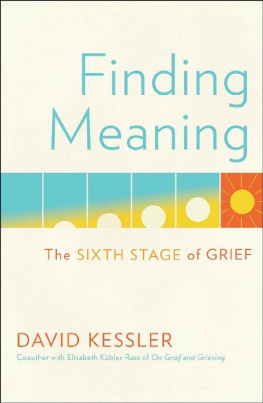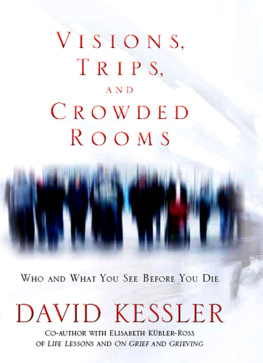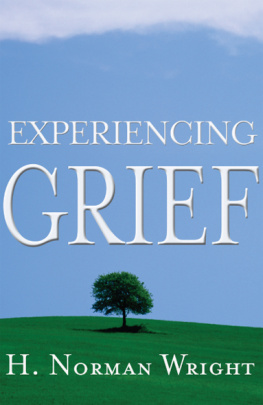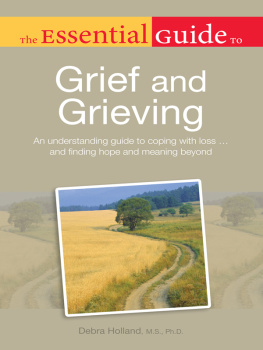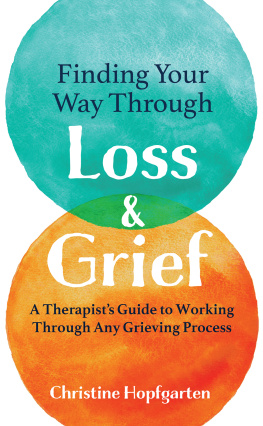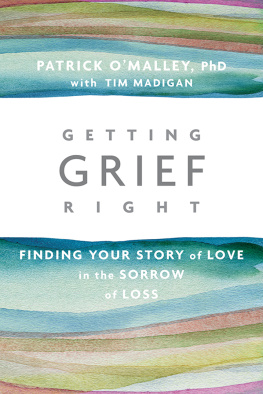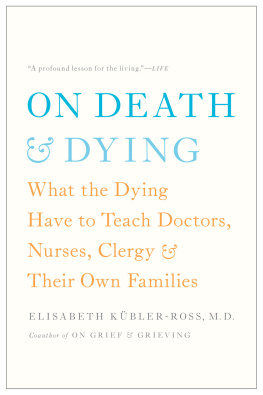Thank you for downloading this Simon & Schuster ebook.
Get a FREE ebook when you join our mailing list. Plus, get updates on new releases, deals, recommended reads, and more from Simon & Schuster. Click below to sign up and see terms and conditions.
CLICK HERE TO SIGN UP
Already a subscriber? Provide your email again so we can register this ebook and send you more of what you like to read. You will continue to receive exclusive offers in your inbox.
To my son in heaven and my son on earth
Authors Note
The stories in this book recount the challenges that numerous families and their friends have faced in grief and the insights they have gained. The names and other characteristics of many of the people in these stories have been changed. Some of the people portrayed in these pages are composites of two or more individuals.
Introduction
In 1969, Elisabeth Kbler-Ross identified the five stages of dying in her groundbreaking book On Death and Dying. As a psychiatrist, she saw that patients who were dying appeared to go through common experiences or stages. Her work captured the worlds attention and would forever change the way we talk and think about death and dying. She ushered the truth of this universal experience out of shadowy euphemism and into the light.
Decades later, I was privileged to have been her protg and friend, and to have coauthored with her a book entitled Life Lessons: Two Experts on Death & Dying Teach Us About the Mysteries of Life and Living. In the second book we wrote together, On Grief and Grieving, which was her last, Elisabeth asked me to help adapt the stages she had observed in the dying to account for the similar stages we had also observed in those who are grieving. The five stages of grief are:
- Denial: shock and disbelief that the loss has occurred
- Anger: that someone we love is no longer here
- Bargaining: all the what-ifs and regrets
- Depression: sadness from the loss
- Acceptance: acknowledging the reality of the loss
The five stages were never intended to be prescriptive, and this holds true for both dying and the subject of this book, grieving. They are not a method for tucking messy emotions into neat packages. They dont prescribe, they describe. And they describe only a general process. Each person grieves in his or her own unique way. Nonetheless, the grieving process does tend to unfold in stages similar to what we described, and most people who have gone through it will recognize them. In the years since that books publication, Ive experienced a great loss myself, and I can confirm that the five stages really do capture the feelings we experience as we grapple with the death of loved ones.
The fifth of Kbler-Rosss five stages is acceptance. At this stage, we acknowledge the reality of the loss. We take some time to stop and breathe into the undeniable fact that our loved ones are gone. Theres nothing easy about this stage. It can be extremely painful, and acceptance doesnt mean that we are okay with the loss, or that the grieving process is now officially over. However, theres been an assumed finality about this fifth stage that Elisabeth and I never intended. Over the years I came to realize that theres a crucial sixth stage to the healing process: meaning. This isnt some arbitrary or mandatory step, but one that many people intuitively know to take and others will find helpful.
In this sixth stage we acknowledge that although for most of us grief will lessen in intensity over time, it will never end. But if we allow ourselves to move fully into this crucial and profound sixth stagemeaningit will allow us to transform grief into something else, something rich and fulfilling.
Through meaning, we can find more than pain. When a loved one dies, or when we experience any kind of serious lossthe end of a marriage, the closing of the company where we work, the destruction of our home in a natural disasterwe want more than the hard fact of that loss. We want to find meaning. Loss can wound and paralyze. It can hang over us for years. But finding meaning in loss empowers us to find a path forward. Meaning helps us make sense of grief, as you will see from the many stories in this book from people who have gone through this sixth stage.
When working with people whose loved ones have died, I often see how hard they search for meaning. It doesnt matter whether the death occurred after a long debilitating illness or if it came as a total shock after an accident or anything else that was sudden and unexpected. Theres often a desire to see meaning in it.
What does meaning look like? It can take many shapes, such as finding gratitude for the time they had with loved ones, or finding ways to commemorate and honor loved ones, or realizing the brevity and value of life and making that the springboard into some kind of major shift or change.
Those who are able to find meaning tend to have a much easier time grieving than those who dont. Theyre less likely to remain stuck in one of the five stages. For those who do get stuck, this can manifest in many different ways, including sudden weight gain (or loss), drug or alcohol addiction, unresolved anger, or an inability to form or commit to a new relationship out of fear of experiencing yet another loss. If they remain stuck in loss, then they may become consumed by it, making it the focus of their life to the point where they lose all other sense of purpose and direction. Although you cant pin all of your troubles or vices on getting stuck after a loss, there is almost always a connection.
Grief is extremely powerful. Its easy to get stuck in your pain and remain bitter, angry, or depressed. Grief grabs your heart and doesnt seem to let go.
But if you can manage to find meaning in even the most senseless loss, you can do more than get unstuck. When circumstances are at their worst, you can find your best. You can keep growing and finding ways to live a good and someday even a joyous life, one enriched by the lessons and love of the person who died.
The search for meaning after loss will lead each of us along divergent paths. Candy Lightner famously founded Mothers Against Drunk Driving (MADD) in 1980 after her daughter, Cari, was killed by a repeat drunk-driving offender. Even though she never understood why her daughter had to die, she was able to find great meaning in forming a group that saved the lives of others. For her, nothing was worth the cost of losing her daughter, but the ability to create something good from that death helped give her the sense that her daughters life as well as her own had meaning.
John Walsh started the TV show Americas Most Wanted after the murder of his son, Adam. He found great purpose in fighting to get criminals off the streets so no other children would be harmed.
Walsh and Lightner found meaning in starting national organizations. Most of us are not going to act on such a large scale, but thats not an obstacle to creating meaning. We can find meaning in the smallest of moments if we look for it and make a point of creating it.
Marcy grew up with a father whose favorite TV personalities were Milton Berle, Danny Thomas, and Morey Amsterdam. Because her father told her he had met Danny Thomas once, a memory he cherished, after he died she thought of him anytime she saw or heard any reference to Danny Thomas.
One day she was in line at the post office to mail a package and buy some stamps.

